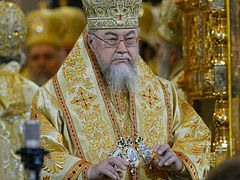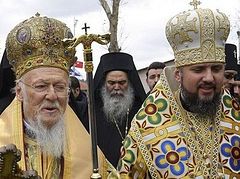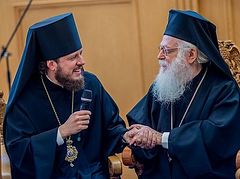Tirana, December 21, 2020
The present crack in Orthodox Church unity is one of our greatest sorrows, believes His Beatitude Archbishop Anastasios of Albania. Two years later, it is obvious that Constantinople’s intervention in Ukraine did not bring any peace, he believes.
Recently recovered from the coronavirus and returned home from the hospital in Athens, the Albanian primate spoke on a number of issues in a new interview with Romfea, including the unfortunate Ukrainian crisis, about which he has strongly spoken several times before.
Answering a question about the Ukrainian schism, the Archbishop began with a lament: “One of the great sorrows of recent times is that Orthodox unity has cracked and that this vague wait is being prolonged.”
It is long past time that the issue is dealt with on a pan-Orthodox level, His Beatitude believes. Already more than a year ago he warned that “a worrying silence prevails in most of the Orthodox Churches.” “Finding ways to transcend this ecclesiastical polarisation is now a matter of urgency,” he wrote at that time, which he echoes in his new interview.
And His Beatitude has, in fact, been sounding the alarm almost since the crisis began in 2018. In October and November 2018, he wrote to His Holiness Patriarch Kirill of Moscow on the Ukrainian issue, where he notes that he had personally warned Pat. Bartholomew that his plans in Ukraine would prove disastrous. At the same time, the Albanian primate also strongly disagrees with the Russian Church’s decision to break Communion with Constantinople. He later sent two letters (here and here) to Pat. Bartholomew, handily debunking Constantinople’s self-justifying arguments and calling again for a pan-Orthodox council to handle the matter. (Abp. Anastasios has even received insulting letters from Constantinople hierarchs for his principled stand.)
“The initiatives in Ukraine, after two years already, obviously did not yield the desired therapeutic effect. Neither peace nor unity was achieved for the millions of Ukrainian Orthodox,” His Beatitude says in his new interview.
And not only did the situation not improve for the faithful of Ukraine, but the problem has now only spread to other Local Churches. “Instead, controversy and division spread to other Local Orthodox Churches,” Abp. Anastasios says.
“Now we must urgently do something effective,” he says, for “Time only worsens the trauma.”
The crisis presents an obvious danger, His Beatitude says, of an “ethno-racial” divide in the Church, between Greeks, Slavs, and those who want peace with all, which “negates” the Church’s multiculturality and universality. To date, only ethnically Greek primates and hierarchs have capitulated to the pressure from Constantinople and recognized the Ukrainian schismatics.
“This is the greatest danger, not only for Orthodoxy, but for all of Christianity,” the Albanian primate affirms.
Reflecting upon his experience of suffering from the coronavirus, Abp. Anastasios says he believes the “spiritual vaccine” in this case is reconciliation, “in the Biblical sense.”
“I confess that I continue to suffer when I cannot agree with my dear and respected brethren, but I am unable to ignore obvious facts and basic Orthodox principles,” he explained.
However, while Abp. Anastasios says the ever-worsening crisis needs to be addressed immediately, he also believes the initiative to do so “undoubtedly belongs to the Ecumenical Patriarchate,” although Pat. Bartholomew has consistently shown himself to be deaf to the cries of his fellow Orthodox hierarchs.
“But all autocephalous Churches should contribute to overcoming the schism to the extent of their responsibility,” the Archbishop adds.
Recall that His Beatitude Patriarch Theophilos of Jerusalem organized a meeting of hierarchs in Amman, Jordan, in February, precisely to address the burning issue of Church unity. However, Abp. Anastasios did not attend because the meeting was not initiated or approved of by Pat. Bartholomew. Other Greek primates refused to attend on the same basis.
Thus, the issue remains at a standstill, as Constantinople will not summon a council to subjects its own actions to examination by the Church as a whole.
However, dialogue and reconciliation will pacify millions of Orthodox faithful, Abp. Anastasios is sure, and will affirm Orthodoxy’s “spiritual capacity to heal wounds, guided by the Word of God and the energy of the Holy Spirit.”
Ethnic struggles
Other hierarchs have also noted the ethnic factor at play in the present crisis.
Speaking in October 2019 about Archbishop Ieronymos of Athens’ decision to recognize the Ukrainian schismatics, His Eminence Metropolitan Nektarios of Corfu of the Greek Orthodox Church said:
“I don’t know if Archbishop Ieronymos was pressured or how he was pressured. However, I think there must have been some kind of serious interference from Ecumenical Patriarch Bartholomew, who pointed out that we are one race—and that is true—and that we as the Orthodox Church of Greece must join with him and the Ecumenical Patriarchate in recognizing the autocephaly of the church of Ukraine.”
Unfortunately, the Ukrainian crisis is routinely presented by Constantinople and its supporters as a battle of Greeks vs. Slavs for preeminence in the Church. Metropolitan Chrysostomos of Dodoni openly declared that the Greek Church must stand with Constantinople because of shared Greek blood, and a number of hierarchs who spoke at the Bishops’ Council on October 12 focused not on the canonical norms of Orthodoxy, but rather on ethnic ties and frustration with Russian diplomacy.
“Will we reject the most sacred institution of the nation?” Metropolitan Paul of Drama asked, arguing in favor of supporting Constantinople in its Ukrainian invasion.
And, unfortunately, in October 2018, Pat. Bartholomew himself declared that “Our Slavic brothers cannot tolerate the primacy of the Ecumenical Patriarchate and our nation in Orthodoxy,” and “Whether our Russian brothers like it or not, sooner or later, they will follow the decisions of the Ecumenical Patriarch, because they have no other choice.”
More recently, the Cypriot hierarchs who oppose Archbishop Chrysostomos’ decision to recognize the Ukrainian schismatics have been accused of not being Greek enough and not loving the Greek nation.
The hierarchs of the Polish Orthodox Church and others have also warned of the sad possibility of an ethnic divide in the Church.
Follow us on Facebook, Twitter, Vkontakte, Telegram, WhatsApp, Parler, MeWe, and Gab!





